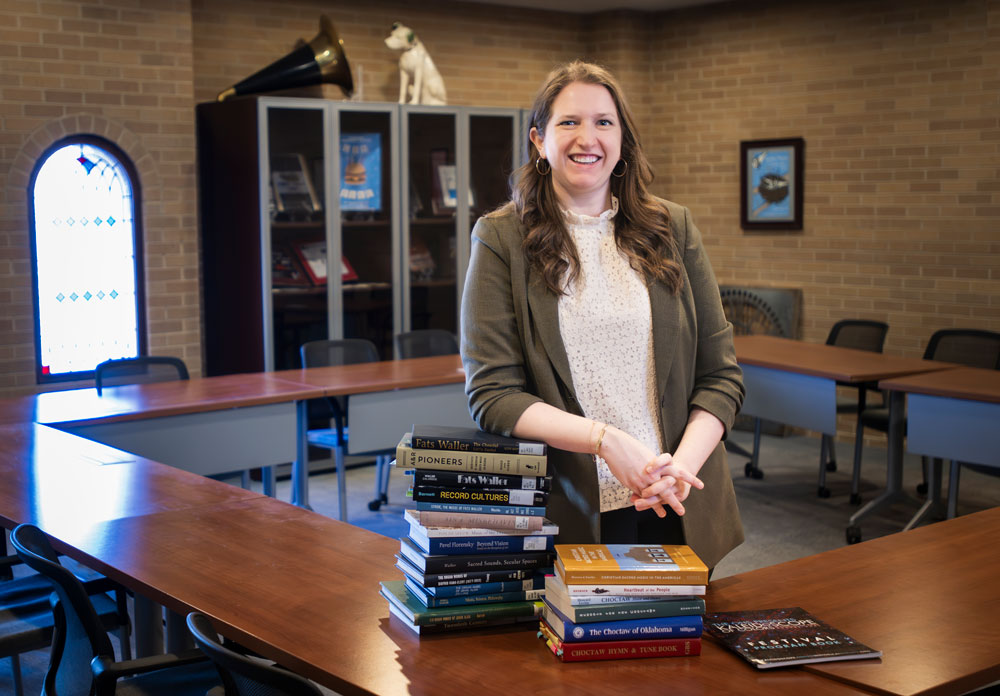The Texas Leadership Research Scholars Program, which debuted in Fall 2024, is a Texas Higher Education Coordinating Board research scholarship and leadership opportunity program for high-achieving graduate students with financial need.
UNT is among only nine public universities in the state selected to participate in the inaugural cohort of the program, which awards selected doctoral researchers a nearly $18,000 scholarship renewable for up to four years.
“This program is not only bringing financial support for these doctoral researchers to continue their education, but also giving them access to a peer network and mentoring that will help set them up for career success after they graduate,” says Brenda Barrio, UNT assistant vice president for research and innovation.
A total of six UNT students were named in the first cohort of Texas Leadership Research Scholars — Garrett Cayce in the College of Engineering; Araceli Herrera Mondragon, Celeste Ortega-Rodriguez and Jose Robledo in the College of Science; Christian Quintero in the College of Education; and Emma Wimberg in the College of Music.
Read Wimberg’s story below and check back on the UNT Research website throughout Spring 2025 to learn more about other students in the inaugural group of Texas Leadership Research Scholars.
Adding to Music History
 Emma Wimberg remembers the exact moment she began playing the organ. As a seventh
grader on a church trip, Wimberg’s choir director and organist called her up in front
of the whole group to perform.
Emma Wimberg remembers the exact moment she began playing the organ. As a seventh
grader on a church trip, Wimberg’s choir director and organist called her up in front
of the whole group to perform.
“She was like, ‘Here Emma, step into my shoes and play the organ.’
With the logical arrangement of its music and the fullness of sound the instrument brings — she fell in love.
And while she still teaches piano and plays organ occasionally at churches in the Dallas-Fort Worth area, Wimberg decided to go a different route with her career.
“While learning about the music I was playing, I realized the part I really loved is the history of it, like how this music fit into the society around it or why it’s written a certain way,” says Wimberg, who plans to eventually become a professor teaching music history and musicology.
As a doctoral student in musicology at UNT, Wimberg’s research has taken her many directions: from her scholarly article on rare pipe organ recordings performed by renowned jazz pianist Fats Waller during the 1920s-1930s Harlem Renaissance, to her dive into hymnody as a lens to view the changing musical and religious lives of the Choctaw during their removal from Mississippi to Oklahoma in the 19th century.
“Emma’s combination of independence of mind, wide-ranging curiosity and intellectual generosity are unusual for a graduate student,” says Wimberg’s faculty mentor Beth Snyder, assistant professor of music history. “She is a productive and original scholar developing innovative research in areas of music scholarship that remain largely under-examined.”
For Wimberg’s dissertation, she’s researching early 20th century organ music from two composers — Sigfrid Karg-Elert and Jehan Alain.
“So, usually we have ways that we expect music to sound, but these two composers were writing music that sounded very different. They pushed the boundaries of tonality for sacred organ works of their time,” Wimberg says.
Because these composers were from Germany and France, respectively, she’s planning to visit each of those countries this summer to conduct archival research. Thanks to the financial support that comes from being a Texas Leadership Research Scholar, she doesn’t have to wait and wonder if funding will come through to proceed with her research.
“I know what questions I’m asking, but until you get into those primary sources, anything can change,” Wimberg says. “A lot of the sources related to these composers remain undigitized, so there are papers I need to go touch, flip and search through that will help me gain a deeper understanding of their music and how it was perceived during their time.”